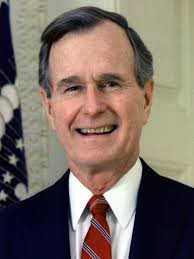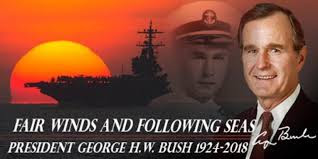George H. W. Bush 41st President of the United States passed away on November 30, 2018, at the
age of 94 years. MAY HIS SOUL REST IN PEACE.
George Herbert Walker Bush,
The World War II naval aviator, Texas oil pioneer, the American politician and 41st President of the United States of America from 1989 to 1993.
Bush served as the 43rd Vice President of the United
States from 1981 to 1989.
He was member of the Republican Party, a U.S. Representative, Ambassador, and Director of Central Intelligence. During
his career in public service, he was known simply as George Bush; from
2001 until his death, he was often referred to as "George H. W.
Bush", "Bush 41", or "George Bush Sr." to distinguish
him from his eldest son, George W. Bush, the 43rd President of the United
States.
His early Career.
At the age of 18 he became the youngest aviator in the
U.S. Navy at the time. He served until September 1945, After word he entered
the oil business and became a millionaire by the age of 40 in 1964. Soon
after founding his own oil company,
His Political Career
Bush became involved in politics. He was
defeated in his first election, for the U.S. Senate in 1964, but won
election to the House of Representatives from Texas's 7th district in
1966. He was re-elected in 1968 but was defeated for election to the Senate
again in 1970. In 1971, President Richard Nixon appointed Bush
as Ambassador to the United Nations, and in 1973, Bush became the Chairman
of the Republican National Committee. The following year, President Gerald
Ford appointed Bush as Chief of the Liaison Office in China and
later reassigned Bush to the position of Director of Central Intelligence.
Bush ran for president in 1980, but was defeated in the Republican
primary by Ronald Reagan. Reagan chose Bush as his running mate, and
Bush became vice president after the Reagan–Bush ticket won the 1980 election.
During his eight-year tenure as vice president, Bush headed administration task
forces on deregulation and prosecuting the war on drugs.
In 1988, Bush ran a successful campaign to succeed
Reagan as president, defeating Democratic opponent Michael
Dukakis, becoming the first incumbent vice president. Foreign policy drove
the Bush presidency: Military operations were conducted in in
Panama and the Persian Gulf; the Berlin Wall fell in 1989,
and the Soviet Union dissolved two years later. Bush also signed
the North American Free Trade Agreement (NAFTA), which created
a trade bloc consisting of the United States, Canada, and Mexico.
Domestically, Bush reneged
on a 1988 campaign promise and, after a struggle with Congress, signed an
increase in taxes that Congress had passed. In the wake of a weak recovery from
an economic recession, along with continuing budget deficits and the
diminution of foreign politics as a major issue in a post-Cold War political
climate, he lost the 1992 presidential election to Democrat Bill
Clinton.
Bush left office in 1993. His presidential library was
dedicated in 1997, and he was active—often alongside Bill Clinton—in
humanitarian activities. With George W. Bush's(his elder son) victory in the 2000 presidential
election, Bush and his son became the second father–son pair to serve as
president, following John Adams and John Quincy Adams. Bush's
second son, Jeb Bush, served as the 43rd Governor of Florida and
sought the Republican presidential nomination in 2016.
Source: Wikipedia 


No comments:
Post a Comment